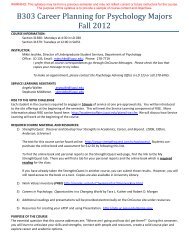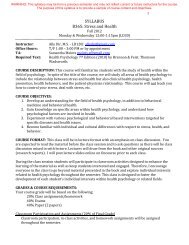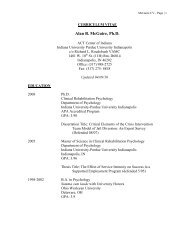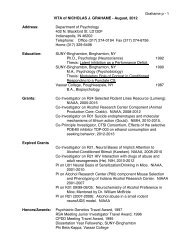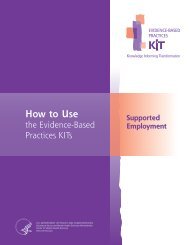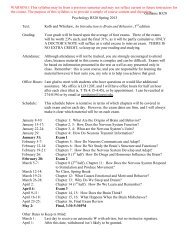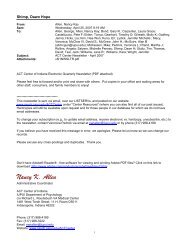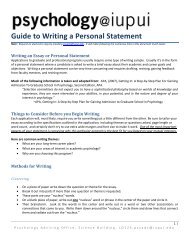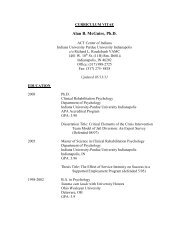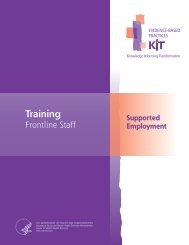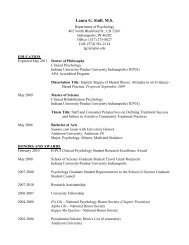B358 Course Syllabus, Fall 2012, Sliter - Psychology @ IUPUI
B358 Course Syllabus, Fall 2012, Sliter - Psychology @ IUPUI
B358 Course Syllabus, Fall 2012, Sliter - Psychology @ IUPUI
You also want an ePaper? Increase the reach of your titles
YUMPU automatically turns print PDFs into web optimized ePapers that Google loves.
WARNING: This syllabus may be from a previous semester and may not reflect current or future instructors for the course.<br />
The purpose of this syllabus is to provide a sample of course content and objectives.<br />
PSY <strong>B358</strong><br />
Introduction to Industrial/Organizational (I/O) <strong>Psychology</strong><br />
<strong>Fall</strong> <strong>2012</strong><br />
Find a job you like and you add five days to every week.<br />
-H. Jackson Brown<br />
Contact Information<br />
Professor:<br />
Office:<br />
Email:<br />
Office Hours:<br />
Dr. Michael <strong>Sliter</strong><br />
LD126P<br />
msliter@iupui.edu<br />
By appointment<br />
<strong>Course</strong> Details<br />
<strong>Course</strong> Time and Location<br />
Thursdays from 6:00-8:40pm<br />
ICTC (IT) Room 252<br />
Textbook (required)<br />
Levy, P. E. (2010). Industrial Organizational <strong>Psychology</strong>: Understanding the Workplace (3 rd Ed.). New York:<br />
Worth.<br />
Objectives<br />
The goal of this course is to familiarize you with what I/O psychology is and what I/O psychologists do. This<br />
will be done with an emphasis on how I/O research, theory, and practice are applicable to you, either as a future<br />
psychologist or as a future member of the workforce.<br />
By the end of the course:<br />
Given a topic within I/O psychology, you will be able to recognize key theories applicable to<br />
that topic.<br />
Given the name of major theories within I/O psychology, you will be able to recognize the major<br />
components of these theories and the definitions of these components.<br />
Given a situation within your work life or a description of a hypothetical work situation, you<br />
will be able to apply theories and research from I/O psychology to that situation.<br />
1
WARNING: This syllabus may be from a previous semester and may not reflect current or future instructors for the course.<br />
The purpose of this syllabus is to provide a sample of course content and objectives.<br />
Attendance<br />
Evaluation<br />
Attendance will be not explicitly assessed in this class. However, given that this class is only held one day per week,<br />
attendance is especially important, and missed days will negatively impact your grade through missed quizzes, in-class<br />
assignments, and guest lectures.<br />
In-Class Assignments – 50 points<br />
We will frequently do in-class exercises designed to help you understand the course content and to make it more relevant<br />
to you. You will turn in these exercises at the end of the class in which they are assigned. If you are not present, you will<br />
not get credit for these activities (i.e., they cannot be made up if you miss class).<br />
Project – 150 points<br />
You will complete a written project as part of this course. The project will consist of a report written in response to a<br />
structured assignment. There will be two options for this report. The first option is tailored toward students interested in<br />
pursuing graduate study in I/O psychology or other psychological disciplines, and the second option is tailored toward<br />
students interested primarily in I/O psychology as it applies to their future in the workplace. More information on the<br />
project, including a detailed description and grading criteria, is available in the handout entitled “Final Project<br />
Description and Grading Criteria.”<br />
The project will be due at the beginning of class on December 6.<br />
Late projects will not be accepted. If you think there may be any issues with your ability to turn in your project in class, I<br />
urge you to turn it in early. Please note that computer issues (a computer crashing, losing data, etc.) are NOT valid<br />
excuses for turning in the project late. Follow good practices for backing up your data!<br />
Quizzes – 200 points<br />
In lieu of traditional exams, we will be having weekly quizzes. The quizzes will consist of a variable amount of items,<br />
and will be evaluating the material covered in lecture and in the book from the previous week. If we have a lecturer speak<br />
during the previous week, material they cover is fair game for the quiz. Across the semester, we will have 14 quizzes.<br />
Your lowest two quiz scores will be dropped (including zeros), and the scores on the remaining 12 quizzes will be<br />
weighted out of 200 points.<br />
Because your lowest two scores are dropped, this should account for illnesses and other issues. As such, NO MAKE UP<br />
QUIZZES WILL BE ALLOWED. If you are thinking of missing class for minor reasons (i.e., “I’m tired,” “I don’t feel like<br />
going”), you might reconsider and save your missed days in case of a real emergency. Also, note that the final exam day<br />
is actually reserved for Quiz 14. If you save your “missed” quizzes for the final quiz, you don’t have to be there.<br />
Guest Lecturers<br />
We will have several guest lecturers coming to class throughout the semester. You are expected to pay attention,<br />
participate, and be respectful. If I am not satisfied with the overall classroom behavior during these talks, everyone will<br />
lose one full percentage point off their final grade.<br />
Extra Credit<br />
Opportunities for extra credit MAY be provided at various times throughout the semester. I will notify you of any extra<br />
credit opportunities.<br />
2
WARNING: This syllabus may be from a previous semester and may not reflect current or future instructors for the course.<br />
The purpose of this syllabus is to provide a sample of course content and objectives.<br />
Final Grading<br />
The final grade in this course will be based on th e percentage of 400 points attainable in the class:<br />
Assignment Points Possible Percent<br />
In-class Assignments 50 12.5%<br />
Project 150 37.5%<br />
Quizzes 200 50%<br />
Total: 400 100<br />
Grade cutoffs<br />
A+ 100%+ C+ 78-79% F Below 60%<br />
A 92-99% C 72-77%<br />
A- 90-91% C- 70-71%<br />
B+ 88-89% D+ 68-69%<br />
B 82-87% D 62-67%<br />
B- 80-81% D- 60-61%<br />
*If your final percentage total ends in .5 or up it will be rounded up to the next highest number.<br />
Oncourse<br />
You will be able to access up-to-date information regarding your grades on Oncourse. It is your responsibility to ensure<br />
that all grades have been posted correctly. If you believe that one of your grades is incorrect, contact me as soon as you<br />
notice the potential problem. DO NOT WAIT until the end of the semester.<br />
A course schedule, overviews of the lecture notes, various announcements, class polls, and other course related materials<br />
will also be available at the Oncourse website, so please login regularly to keep up-to-date on these materials.<br />
3
WARNING: This syllabus may be from a previous semester and may not reflect current or future instructors for the course.<br />
The purpose of this syllabus is to provide a sample of course content and objectives.<br />
Expectations<br />
Participation<br />
Participation will be a key component of this course. It will be essential that you have read the assigned<br />
readings BEFORE class and that you are ready to be an active participant in classroom discussions.<br />
Attendance<br />
Attending class is an essential part of learning the material. Further, because the class will only be held once<br />
per week, missing a single class will mean missing an entire week’s worth of material. As such, it is expected<br />
that you will attend class every time it is held. Furthermore, it is expected that you will arrive on time and<br />
remain focused until class has ended.<br />
<strong>Course</strong> Notes<br />
Though a rough outline of the notes will be provided on Oncourse ahead of time to aid in taking notes during<br />
class, this will NOT provide all of the information given during lecture and will not substitute for<br />
attendance at lecture. In the past, students have found it helpful to either print the notes or to view them on a<br />
laptop during class. Please use whatever method works best for you, however if laptops become a distraction<br />
they will be disallowed.<br />
Readings<br />
There will be a set of assigned readings that must be done BEFORE each class. If you don’t read the book<br />
ahead of time, you will not be able to keep up with the material taught during class. Please set aside time each<br />
week in your schedule to read the assigned readings.<br />
Behavior<br />
My expectations for your behavior in this class are based on mutual respect among all members of this class,<br />
including the instructor. Please uphold this respect by arriving to class on time, turning off cell phones, not<br />
leaving early, and paying attention. Please do not come to class with the intention of chatting with friends (in<br />
person or via text messaging), reading the newspaper, sleeping, or other inappropriate activities. In addition,<br />
please respect the opinions of other students and refrain from communication that is offensive to others.<br />
E-Mail Communication<br />
This is an institution of higher learning, and your communication should reflect this. All emails sent to either<br />
me or the TA must be professional in nature, including a greeting, a clear purpose to the email, and a closing<br />
(e.g., Thanks; name; Sincerely; name). Additionally, you must exhaust other resources before sending an email.<br />
For instance, don’t send an email to ask “when’s the test?” before checking your syllabus.<br />
Requests for Reconsidering a Grade<br />
If you feel that an assignment has been improperly evaluated, you can ask to have the grade reviewed and<br />
reconsidered. To make such a request, you must give me a written statement (approximately 1-2 paragraphs)<br />
explaining what you believe is the issue with the grade. Although I will not re-grade assignments simply<br />
because you feel that your grade is too low, if you feel that I have made an error I will be happy to revisit the<br />
grade.<br />
4
WARNING: This syllabus may be from a previous semester and may not reflect current or future instructors for the course.<br />
The purpose of this syllabus is to provide a sample of course content and objectives.<br />
Academic Dishonesty<br />
Academically dishonest behaviors are unacceptable and will not be tolerated. Behaviors such as cheating on<br />
tests or plagiarizing ANY of your project work (borrowing from other students, from the textbook, from any<br />
website, from your articles, or any other outside source and claiming it as your own) are unacceptable. If you<br />
cheat or plagiarize you will receive, at a minimum, a zero on the assignment, and you will be referred to the<br />
chairperson of the department and the Dean.<br />
For more information, see the <strong>IUPUI</strong> Student Code of Conduct - http://www.iupui.edu/code/<br />
Special Arrangements for Students with Disabilities<br />
If you require special arrangements, please let me know during the first week of class. The Office of Adaptive<br />
Educational Services (AES) helps students with disabilities receive appropriate accommodations from the<br />
university and their professors. Students need to register with the AES office in order to officially receive such<br />
services. For information, call (317) 274 3241 or go to http://www.iupui.edu/~divrsity/aes/<br />
Note. The contents of this syllabus are subject to change as necessary at the discretion of the instructor.<br />
5
WARNING: This syllabus may be from a previous semester and may not reflect current or future instructors for the course.<br />
The purpose of this syllabus is to provide a sample of course content and objectives.<br />
<strong>Course</strong> Schedule*<br />
Date Topic Chapters Other<br />
23-Aug<br />
Introduction to and History of I-O<br />
<strong>Psychology</strong><br />
1 <strong>Syllabus</strong> overview<br />
30-Aug<br />
Research Methods in I-O<br />
<strong>Psychology</strong><br />
2 Quiz 1<br />
6-Sep Job Analysis 3 Quiz 2; Assignment of Final Paper<br />
13-Sep Criterion Measurement (Outcomes) 4 Quiz 3<br />
20-Sep Performance Appraisal 5<br />
Quiz 4; Guest: Dr. Jane Williams;<br />
Topic for Final Paper Due<br />
27-Sep<br />
Predictors and Individual<br />
Differences<br />
6 Quiz 5; Guest: Dr. Katherine <strong>Sliter</strong><br />
4-Oct WORK DAY -- NO CLASSES Work on your final papers!<br />
11-Oct Selection 7 Quiz 6<br />
18-Oct Training 8<br />
Quiz 7; Guest: Dr. Leslie Ashburn-<br />
Nardo<br />
25-Oct Motivation 9 Quiz 8<br />
1-Nov Attitudes 10 Quiz 9<br />
8-Nov Occupational Health <strong>Psychology</strong> 11 Quiz 10; Guest: Dr. Elizabeth Boyd<br />
15-Nov Group Processes and Work Teams 12 Quiz 11; Guest: Dr. Dennis Devine<br />
22-Nov<br />
THANKSGIVING BREAK -- NO<br />
CLASSES<br />
29-Nov Leadership 13 Quiz 12; Guest: Dr. Peggy Stockdale<br />
6-Dec<br />
Organizational Theory and<br />
Development<br />
14 Quiz 13; FINAL PAPER DUE<br />
11-Dec Final Exam (Quiz) (6:00-8:00) Quiz 14<br />
*Schedule is tentative and may change. Please read all chapters BEFORE arriving in class.<br />
6



